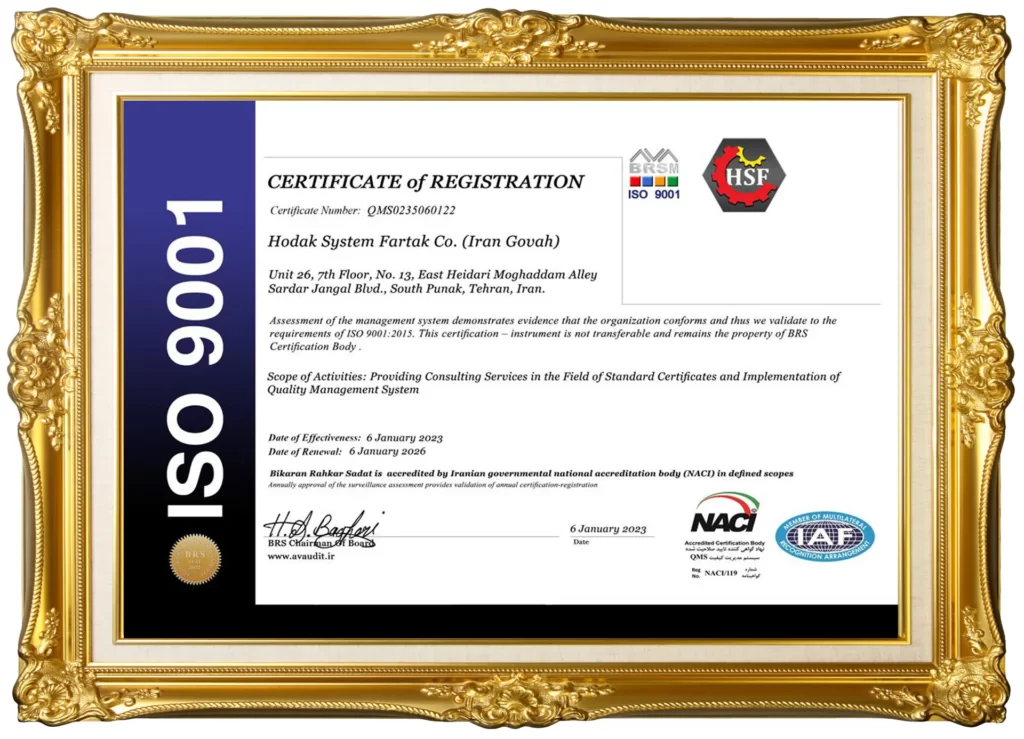An Accreditation Body: Definition, Importance, and Functions
An Accreditation Body (AB) is an organization that is responsible for evaluating and accrediting conformity assessment bodies (CABs). The main function of an AB is to ensure that CABs operate in accordance with international standards and guidelines, and that they provide reliable and impartial assessment services. In this article, Iran Govah will explore the definition, importance, and functions of an Accreditation Body.

Definition of an Accreditation Body
An Accreditation Body (AB) is a type of organization that is responsible for accrediting conformity assessment bodies (CABs). CABs are organizations that conduct assessments, tests, and inspections to ensure that products, services, and systems meet certain standards and requirements. CABs include testing laboratories, certification bodies, inspection bodies, and other types of organizations that provide conformity assessment services.
The main function of an AB is to evaluate the competence and impartiality of CABs, and to grant accreditation to those that meet the required standards and criteria. Accreditation provides assurance that the CAB has the necessary technical competence and operates in an impartial and consistent manner.
Importance of Accreditation Bodies
Accreditation Bodies play an important role in ensuring the reliability and quality of conformity assessment services. Accreditation provides assurance to stakeholders, such as customers, regulators, and other interested parties, that the CAB operates in accordance with international standards and guidelines, and that the results of assessments and tests are reliable and impartial.
In addition, accreditation provides a level of confidence in the results of conformity assessment services, which can help to reduce risks and costs associated with non-conformities. Accreditation also helps to promote fair competition and trade by ensuring that products and services are assessed and certified using the same standards and criteria.
Functions of an Accreditation Body
The functions of an Accreditation (1) Body can be broadly categorized into three main areas:
- Evaluation of Conformity Assessment Bodies (CABs): The main function of an Accreditation Body is to evaluate the technical competence and impartiality of CABs. This evaluation is carried out through a rigorous assessment process that includes document review, on-site assessments, and proficiency testing. The AB also reviews the management systems of the CAB to ensure that they meet the requirements of international standards and guidelines.
- Accreditation of Conformity Assessment Bodies (CABs): Once the Accreditation Body is satisfied that the CAB meets the required standards and criteria, it grants accreditation to the CAB. Accreditation is a formal recognition that the CAB is competent and operates in accordance with international standards and guidelines.
- Monitoring and Surveillance of Accredited Conformity Assessment Bodies (CABs): The Accreditation Body is responsible for monitoring and surveillance of the CABs that it has accredited. This includes periodic on-site assessments, reviews of management systems, and proficiency testing. The Accreditation Body may also carry out investigations in response to complaints or other issues that arise.
Benefits of Accreditation Bodies
The benefits of accreditation bodies can be seen from different perspectives. Here are some of the benefits that they bring to the table:
- Assuring Competence: Accreditation bodies ensure that conformity assessment bodies are competent in the areas they claim to assess. They set rigorous standards and perform regular assessments to ensure that these bodies meet the requirements.
- Confidence Building: Accreditation bodies provide a level of confidence to stakeholders and customers that conformity assessment bodies are trustworthy and reliable. This is especially important when it comes to sensitive areas like food safety, healthcare, and environmental management.
- International Recognition: Accreditation bodies provide international recognition for the conformity assessment bodies they accredit. This helps these bodies to compete globally and offer their services to customers around the world.
- Compliance with Standards: Accreditation bodies ensure that conformity assessment bodies comply with relevant standards and regulations. This helps organizations to avoid regulatory fines and other penalties.
- Continuous Improvement: Accreditation bodies promote continuous improvement in conformity assessment bodies by providing feedback and guidance on how to improve their processes and procedures.
Conclusion
In conclusion, accreditation bodies play a vital role in ensuring the quality and reliability of conformity assessment bodies. They provide a framework for assessing the competence of these bodies and help build confidence among stakeholders and customers. By ensuring that conformity assessment bodies comply with standards and regulations, accreditation bodies contribute to public safety, protect the environment, and promote fair trade practices.


